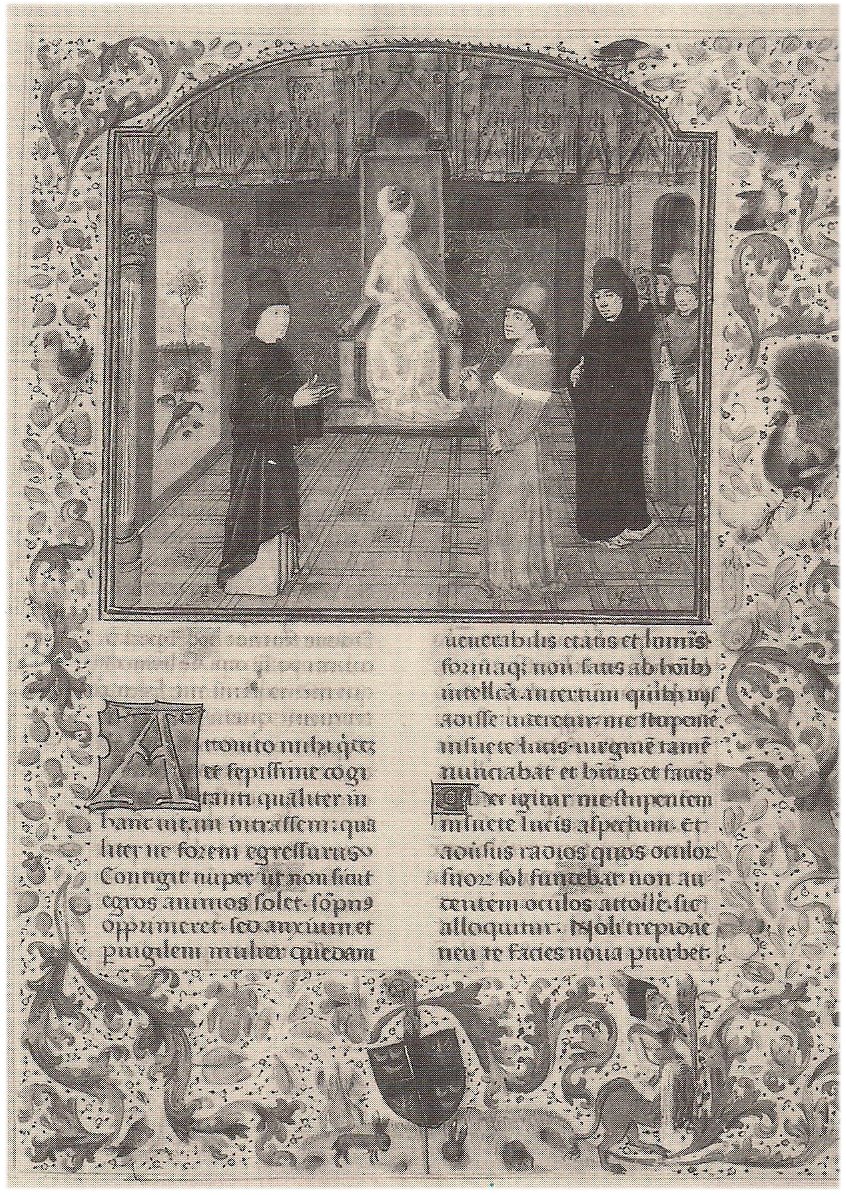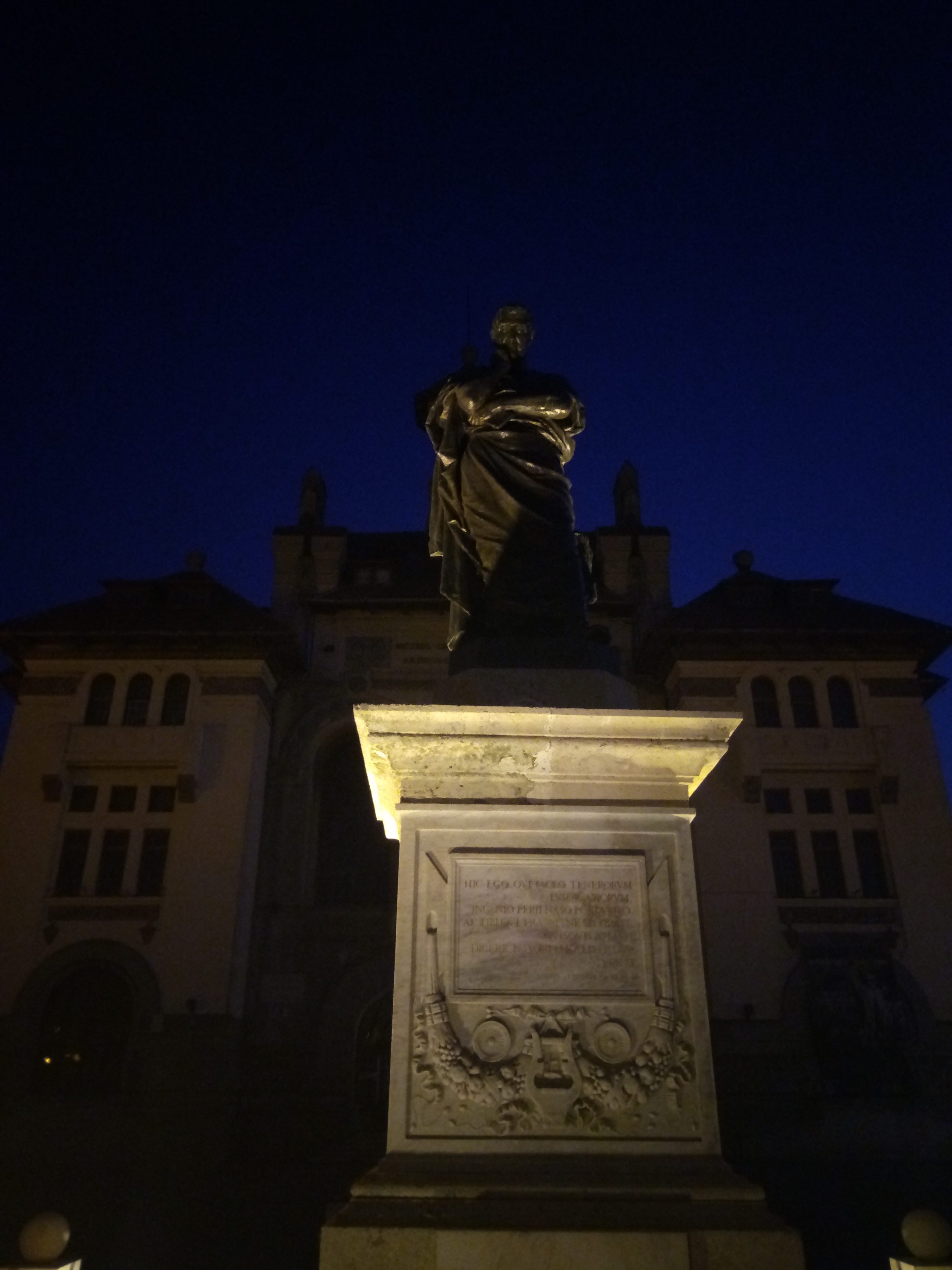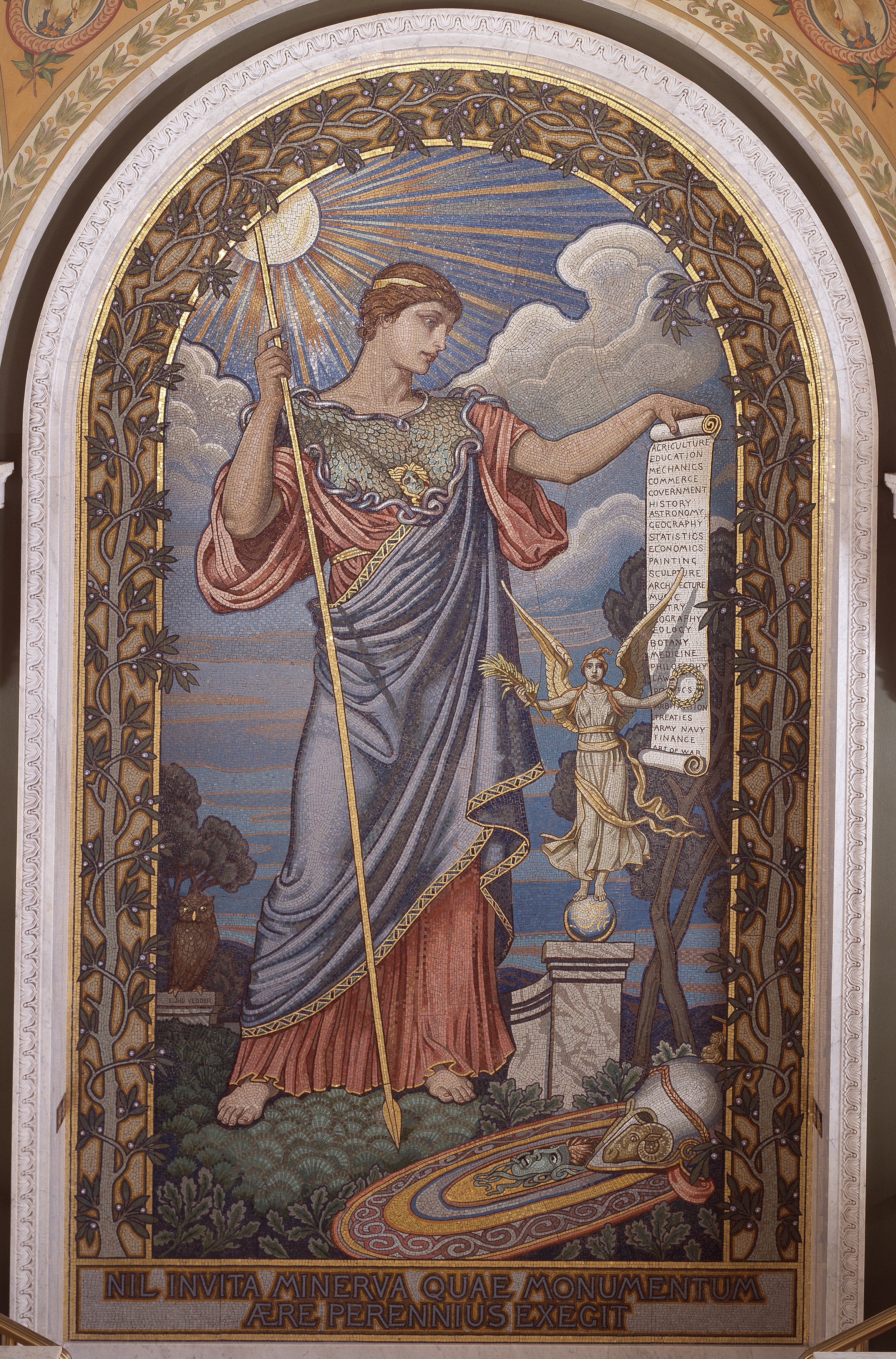|
Secretum (book)
''Secretum'' (''De secreto conflictu curarum mearum'', translated as ''The Secret'' or ''My Secret Book'') is a trilogy of dialogues in Latin written by Petrarch sometime from 1347 to 1353, in which he examines his faith with the help of Saint Augustine, and "in the presence of The Lady Truth". ''Secretum'' was not circulated until some time after Petrarch's death, and was probably meant to be a means of self-examination more than a work to be published and read by others. The dialogue opens with Augustine chastising Petrarch for ignoring his own mortality and his fate in the afterlife by not devoting himself fully to God. Petrarch concedes that this lack of piety is the source of his unhappiness, but he insists that he cannot overcome it. The dialogue then turns to the question of Petrarch's seeming lack of free will, and Augustine explains that it is his love for temporal things (specifically Laura), and his pursuit of fame through poetry that "bind his will in adamantine ch ... [...More Info...] [...Related Items...] OR: [Wikipedia] [Google] [Baidu] |
Secretum used for private correspondence
{{Disambig ...
Secretum may refer to: *Secretum (book), a book by Petrarch *, a book by Monaldi & Sorti * Secretum (room) at the British Museum *A ''sigillum secretum'', a special seal Seal may refer to any of the following: Common uses * Pinniped, a diverse group of semi-aquatic marine mammals, many of which are commonly called seals, particularly: ** Earless seal, or "true seal" ** Fur seal * Seal (emblem), a device to impr ... [...More Info...] [...Related Items...] OR: [Wikipedia] [Google] [Baidu] |
Epistulae Ad Atticum
''Epistulae ad Atticum'' (Latin for "Letters to Atticus") is a collection of letters from Roman politician and orator Marcus Tullius Cicero to his close friend Titus Pomponius Atticus. The letters in this collection, together with Cicero's other letters, are considered the most reliable sources of information for the period leading up to the fall of the Roman Republic. The letters to Atticus are special among Cicero's works in that they provide a candid view into his personal character — containing confession, frank self-revelation, and a record of his moods from day to day, without alteration. Traditionally spanning 16 books, the collection features letters from 68 to 44 BCE. A notable absence of early references to these particular letters suggest that they may not have been published until the middle of the first century CE, significantly later than Cicero's other letters and quite some time after the deaths of both Cicero (43 BCE) and Atticus (32 BCE). A ma ... [...More Info...] [...Related Items...] OR: [Wikipedia] [Google] [Baidu] |
Metamorphoses
The ''Metamorphoses'' ( la, Metamorphōsēs, from grc, μεταμορφώσεις: "Transformations") is a Latin narrative poem from 8 CE by the Roman poet Ovid. It is considered his ''magnum opus''. The poem chronicles the history of the world from its creation to the deification of Julius Caesar in a mythico-historical framework comprising over 250 myths, 15 books, and 11,995 lines. Although it meets some of the criteria for an epic, the poem defies simple genre classification because of its varying themes and tones. Ovid took inspiration from the genre of metamorphosis poetry and some of the ''Metamorphoses'' derives from earlier treatment of the same myths; however, he diverged significantly from all of his models. One of the most influential works in Western culture, the ''Metamorphoses'' has inspired such authors as Dante Alighieri, Giovanni Boccaccio, Geoffrey Chaucer, and William Shakespeare. Numerous episodes from the poem have been depicted in works of sculpture, ... [...More Info...] [...Related Items...] OR: [Wikipedia] [Google] [Baidu] |
Epistulae Ex Ponto
''Epistulae ex Ponto'' (''Letters from the Black Sea'') is a work of Ovid, in four books. It is a collection of letters describing Ovid's exile in Tomis (modern-day Constanța) written in elegiac couplets and addressed to his wife and friends. The first three books were composed between 12–13 AD, according to the general academic consensus: "none of these elegies contains references to events falling outside that time span". The fourth book is believed to have been published posthumously. The poems The themes of the letters are similar to those of ''Tristia''. Ovid writes to his wife and friends about the grimness of his exile, his deteriorating state of health and the future of his literary works. The last surviving letter of the collection is addressed to an unnamed enemy. A recurring request to Ovid's named addressees in ''Epistulae ex Ponto'' remains his desire for a change of location from Tomis, which he repeatedly describes as "a town located in a war-stricken cultural ... [...More Info...] [...Related Items...] OR: [Wikipedia] [Google] [Baidu] |
Amores (Ovid)
''Amores'' is Ovid's first completed book of poetry, written in elegiac couplets. It was first published in 16 BC in five books, but Ovid, by his own account, later edited it down into the three-book edition that survives today. The book follows the popular model of the erotic elegy, as made famous by figures such as Tibullus or Propertius, but is often subversive and humorous with these tropes, exaggerating common motifs and devices to the point of absurdity. While several literary scholars have called the ''Amores'' a major contribution to Latin love elegy, they are not generally considered among Ovid's finest works and "are most often dealt with summarily in a prologue to a fuller discussion of one of the other works". History Ovid was born in 43 BCE, the last year of the Roman Republic, and he grew up in the countryside of Sulmo. Based on the memoirs of Seneca the Elder, scholars know that Ovid attended school in his youth. During the Augustan Era, boys attended schools that f ... [...More Info...] [...Related Items...] OR: [Wikipedia] [Google] [Baidu] |
Ovid
Pūblius Ovidius Nāsō (; 20 March 43 BC – 17/18 AD), known in English as Ovid ( ), was a Roman poet who lived during the reign of Augustus. He was a contemporary of the older Virgil and Horace, with whom he is often ranked as one of the three canonical poets of Latin literature. The Imperial scholar Quintilian considered him the last of the Latin love elegists.Quint. ''Inst.'' 10.1.93 Although Ovid enjoyed enormous popularity during his lifetime, the emperor Augustus banished him to Tomis, a Dacian province on the Black Sea, where he remained a decade until his death. Overview A contemporary of the older poets Virgil and Horace, Ovid was the first major Roman poet to begin his career during Augustus's reign. Collectively, they are considered the three canonical poets of Latin literature. The Imperial scholar Quintilian described Ovid as the last of the Latin love elegists.Quint. ''Inst.'' 10.1.93 He enjoyed enormous popularity during his lifetime, but the emperor Augus ... [...More Info...] [...Related Items...] OR: [Wikipedia] [Google] [Baidu] |
Saturnalia (Macrobius)
''Saturnalia'' ( la, Saturnaliorum Libri Septem, "Seven Books of the Saturnalia") is a work written after 431 CE by the Roman provincial Macrobius Theodosius (b. 390 CE - d. ?). The ''Saturnalia'' consists of an account of the discussions held at the house of Vettius Agorius Praetextatus during the holiday of the Saturnalia. It contains a great variety of curious historical, mythological, critical, antiquarian and grammatical discussions. "The work takes the form of a series of dialogues among learned men at a fictional banquet." There is little attempt to give any dramatic character to the dialogue; in each book some one of the personages takes the leading part, and the remarks of the others serve only as occasions for calling forth fresh displays of erudition. Contents The first book is devoted to an inquiry as to the origin of the Saturnalia and the festivals of Janus, which leads to a history and discussion of the Roman calendar, and to an attempt to derive all forms of wors ... [...More Info...] [...Related Items...] OR: [Wikipedia] [Google] [Baidu] |
Macrobius
Macrobius Ambrosius Theodosius, usually referred to as Macrobius (fl. AD 400), was a Roman provincial who lived during the early fifth century, during late antiquity, the period of time corresponding to the Later Roman Empire, and when Latin was as widespread as Greek among the elite. He is primarily known for his writings, which include the widely copied and read ''Commentarii in Somnium Scipionis'' ("Commentary on the Dream of Scipio") about ''Somnium Scipionis'', which was one of the most important sources for Neoplatonism in the Latin West during the Middle Ages; the ''Saturnalia'', a compendium of ancient Roman religious and antiquarian lore; and ''De differentiis et societatibus graeci latinique verbi'' ("On the Differences and Similarities of the Greek and Latin Verb"), which is now lost. He is the basis for the protagonist Manlius in Iain Pears' book '' The Dream of Scipio''. Name The correct order of his names is "Macrobius Ambrosius Theodosius", which is how it appears ... [...More Info...] [...Related Items...] OR: [Wikipedia] [Google] [Baidu] |
Satires (Juvenal)
The ''Satires'' () are a collection of satirical poems by the Latin author Juvenal written between the end of the first and the early second centuries A.D. Juvenal is credited with sixteen known poems divided among five books; all are in the Roman genre of satire, which, at its most basic in the time of the author, comprised a wide-ranging discussion of society and social in dactylic hexameter. The sixth and tenth satires are some of the most renowned works in the collection. The poems are not individually titled, but translators have often added titles for the convenience of readers. *Book I: Satires 1–5 *Book II: Satire 6 *Book III: Satires 7–9 *Book IV: Satires 10–12 *Book V: Satires 13–16 (Satire 16 is incompletely preserved) Roman was a formal literary genre rather than being simply clever, humorous critique in no particular format. Juvenal wrote in this tradition, which originated with Lucilius and included the Sermones of Horace and the Satires of Persiu ... [...More Info...] [...Related Items...] OR: [Wikipedia] [Google] [Baidu] |
Juvenal
Decimus Junius Juvenalis (), known in English as Juvenal ( ), was a Roman poet active in the late first and early second century CE. He is the author of the collection of satirical poems known as the ''Satires''. The details of Juvenal's life are unclear, although references within his text to known persons of the late first and early second centuries CE fix his earliest date of composition. One recent scholar argues that his first book was published in 100 or 101. A reference to a political figure dates his fifth and final surviving book to sometime after 127. Juvenal wrote at least 16 poems in the verse form dactylic hexameter. These poems cover a range of Roman topics. This follows Lucilius—the originator of the Roman satire genre, and it fits within a poetic tradition that also includes Horace and Persius. The ''Satires'' are a vital source for the study of ancient Rome from a number of perspectives, although their comic mode of expression makes it problematic to acc ... [...More Info...] [...Related Items...] OR: [Wikipedia] [Google] [Baidu] |
Odes (Horace)
The ''Odes'' ( la, Carmina) are a collection in four books of Latin lyric poems by Horace. The Horatian ode format and style has been emulated since by other poets. Books 1 to 3 were published in 23 BC. A fourth book, consisting of 15 poems, was published in 13 BC. The ''Odes'' were developed as a conscious imitation of the short lyric poetry of Greek originals – Pindar, Sappho and Alcaeus are some of Horace's models. His genius lay in applying these older forms to the social life of Rome in the age of Augustus. The ''Odes'' cover a range of subjects – Love, Friendship, Wine, Religion, Morality, Patriotism; poems of eulogy addressed to Augustus and his relations; and verses written on a miscellany of subjects and incidents, including the uncertainty of life, the cultivation of tranquility and contentment, and the observance of moderation or the " golden mean." The ''Odes'' have been considered traditionally by English-speaking scholars as purely literary works. Recent eviden ... [...More Info...] [...Related Items...] OR: [Wikipedia] [Google] [Baidu] |
Epistles (Horace)
The ''Epistles'' (or ''Letters'') of Horace were published in two books, in 20 BC and 14 BC, respectively. *''Epistularum liber primus'' (''First Book of Letters'') is the seventh work by Horace, published in the year 20 BC. This book consists of 20 Epistles. The phrase ''sapere aude'' ("dare to be wise") comes from this collection of poems. *''Epistularum liber secundus'' (''Second Book of Letters'') was published in the year 14 BC. This book consists of 3 Epistles. However, the third epistle – the Ars Poetica – is usually treated as a separate composition. Background As one commentator has put it: "Horace's ''Epistles'' may be said to be a continuation of his Satires in the form of letters... But few of the epistles are ctuallyletters except in form..."The Works of Horace Rendered into English Prose by James Lonsdale M.A. and Samuel Lee M.A. London: MacMillan and Co., 1883. Edition is available on Google Books. They do indeed contain an excellent specimen of a letter of ... [...More Info...] [...Related Items...] OR: [Wikipedia] [Google] [Baidu] |







